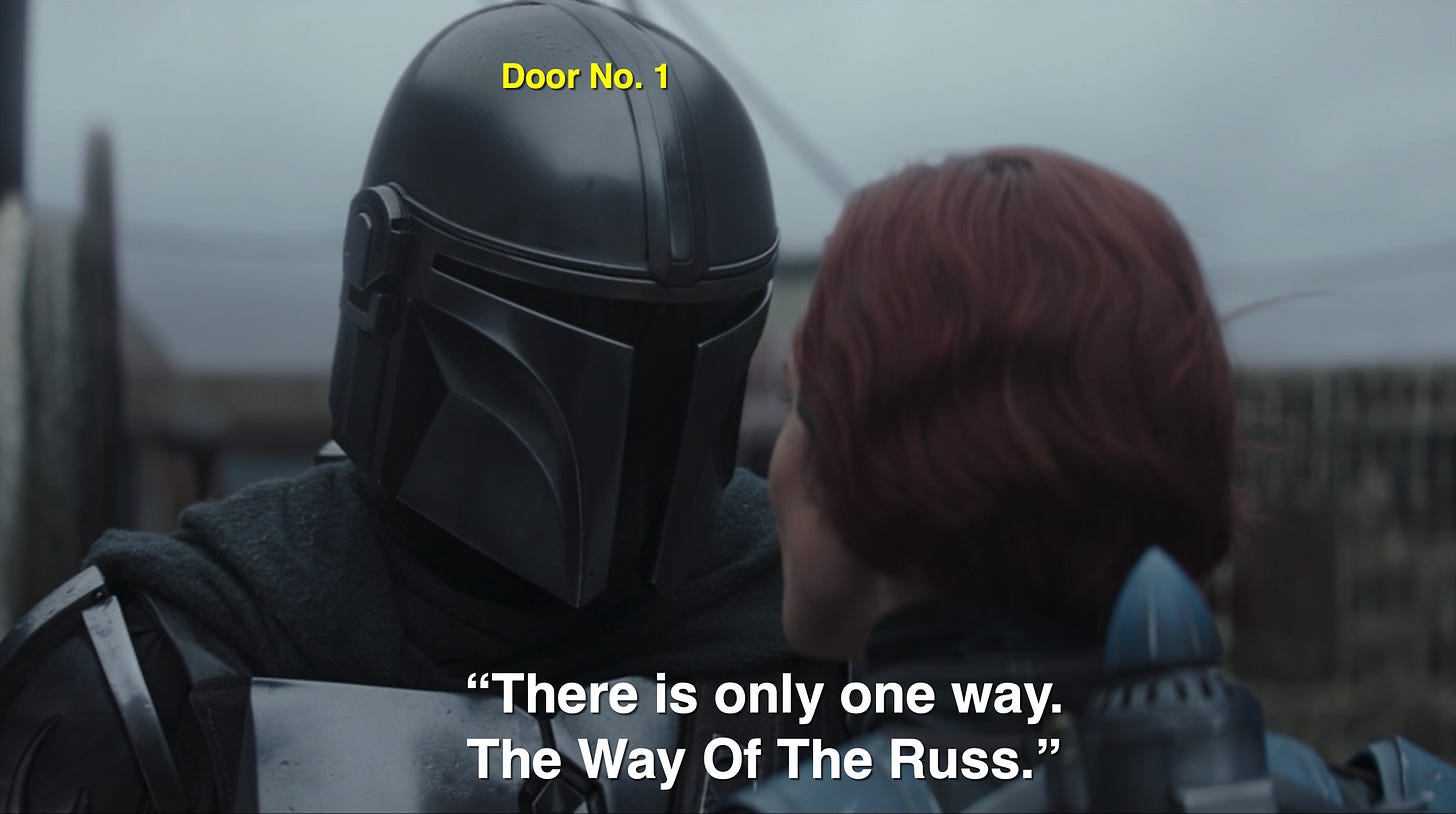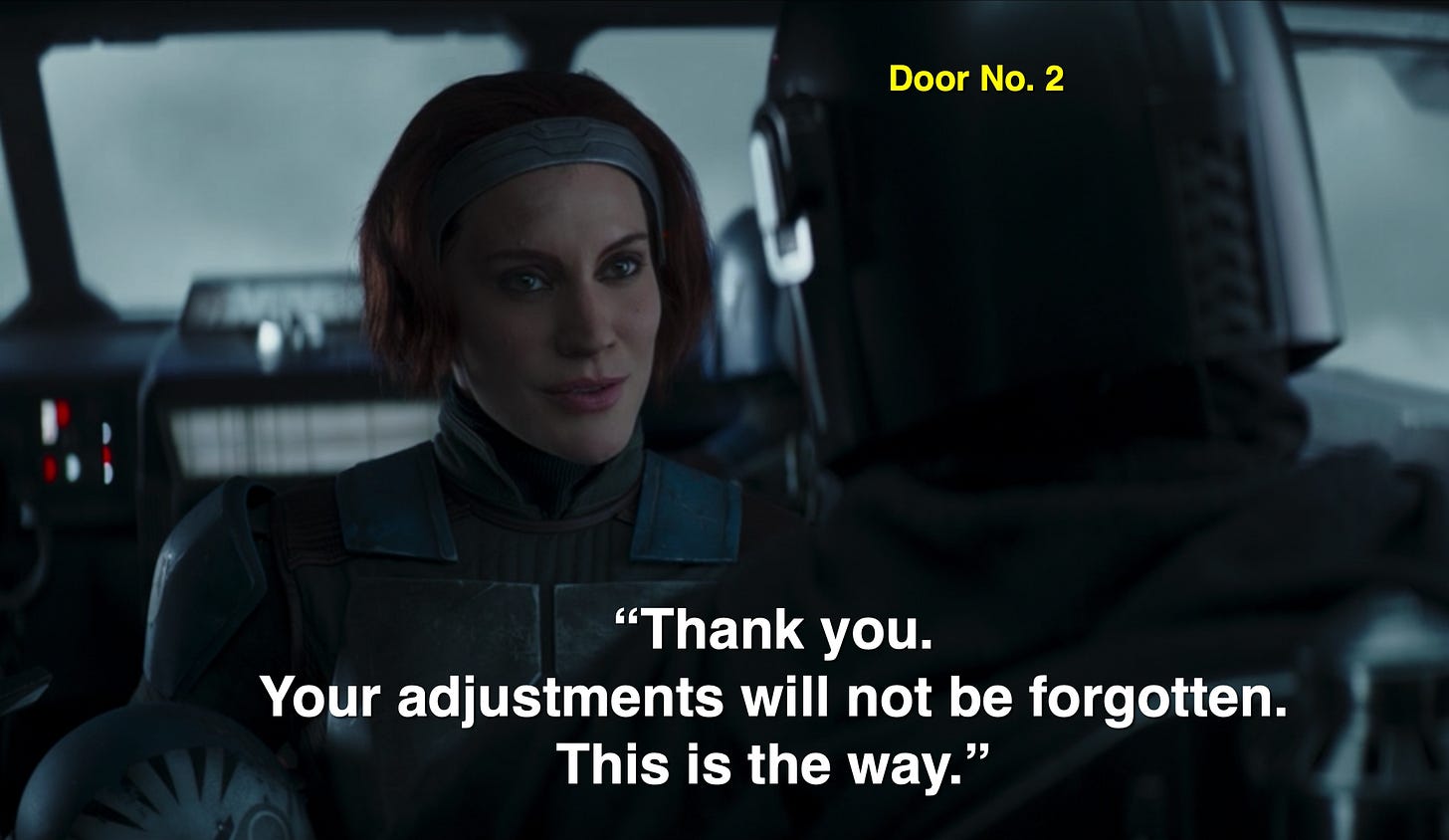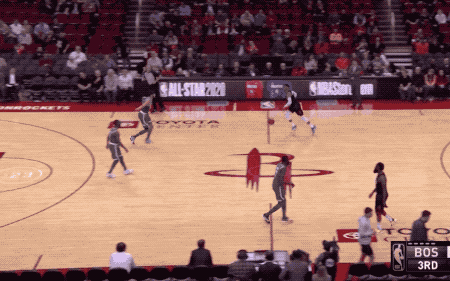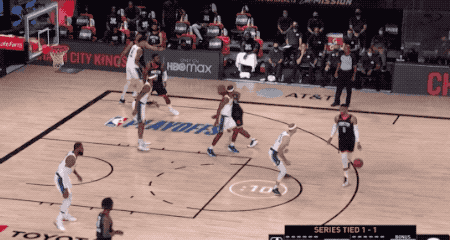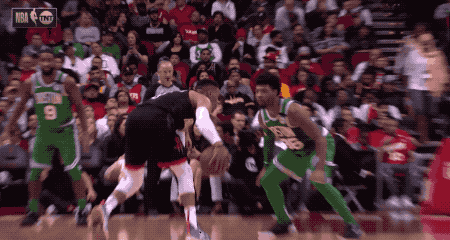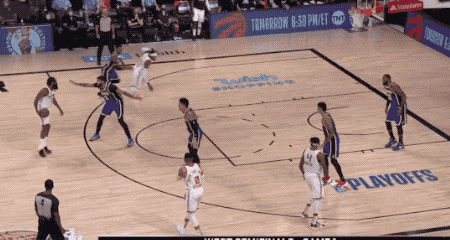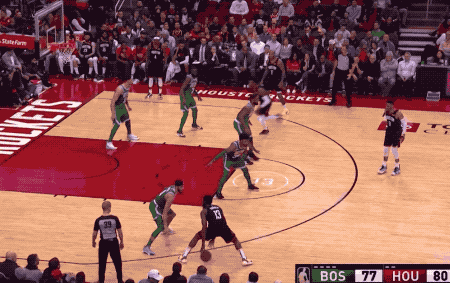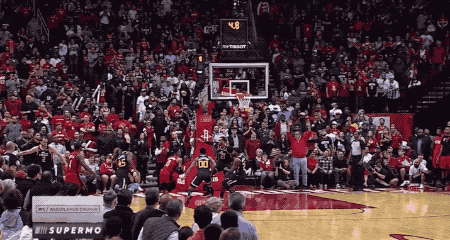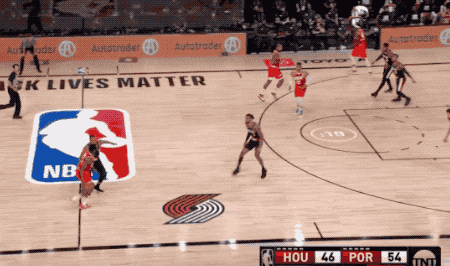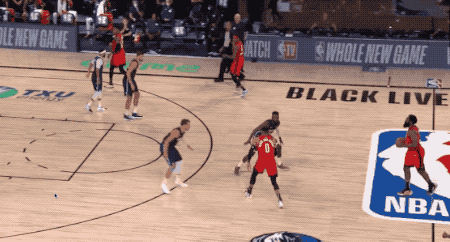(Mandalorian Season 2, Episode 3: “The Heiress)
Back at it after a brief hiatus. Expect regular pieces again now that I (kinda) know how to be a parent to two kids instead of one. Be sure to subscribe if you aren’t already.
Also, subscribe to Limited Upside, my podcast with Ben Epstein on the Blue Wire podcast network. Recent guests include New York Daily News (and SB Nation alum) Kristian Winfield and new Blue Wire host (and Ringer alum) Haley O’Shaughnessy. New episodes drop weekly.
Oh, one more thing: I’m still looking for work! Hit me up at mikeprada1 AT gmail DOT com for freelance, commission, and full-time opportunities.
No matter what happens (or has already happened) this “offseason,” one thing seems certain: the James Harden-Russell Westbrook partnership is in jeopardy. Even if both stay in Houston next year, it won’t be for any real purpose beyond preserving a sunk cost. This is (probably) no title contender anymore.
How this ends is still to be determined. Maybe both get traded. Maybe only one does. Maybe the market stays too cool on Westbrook and not hot enough for the Rockets’ liking on Harden. Maybe Christian Wood and DeMarcus Cousins are the missing pieces to put the Rockets over the top. (I doubt it, but hey, who knows).
Regardless, Harden, Westbrook, and the Rockets are all at the proverbial fork in the road. The crossroads. The place where two paths diverge on a road. Choose your preferred metaphor. You get the point.
Those possibilities are fairly contained for Harden and the Rockets. We can expect Harden to be some degree of a star in the near future, even if his destination and/or surrounding cast changes. We can also expect the Rockets to be somewhere below title contention during that time span, whether they embrace a full-scale rebuild or not. (Again: unless Christian Wood is the missing piece).
Westbrook’s career, on the other hand, could go anywhere. His paths diverge more sharply, and there are more of them in play.
That’s true even if his trade market remains barren for all the reasons we expected last offseason. His contract is massive, his style of play is challenging to blend, and he’s on the wrong side of the aging curve. Toss in his COVID-19 diagnosis, a forgettable postseason, and the league’s cloudy financial future post-pandemic, and Westbrook is a distressed asset, even if the Rockets may be loathe to accept that reality.
That reality also effectively widens his potential career paths. He could experience an Indian summer in his (reportedly) desired “role similar to his prior, floor-general role in Oklahoma City,” to quote The Athletic. Yet he’s also one step away from the Iversonian-esque flameout we’ve all feared for years, when his high-usage style of play and defiant attitude stops him from aging gracefully. Those are complete opposite outcomes, and yet both are in play, as are many others in between. This decade’s most black-and-white player may finally end his career with some shades of grey.
So what does the future hold for Russell Westbrook? I see two range of possibilities, with one being more likely than the other. Neither will satisfy Westbrook or his legion of supporters, but both offer some beauty if the beholder is willing to see it.
1. The lead guard future
Westbrook’s rough postseason after the restart left a bad taste in our mouths. It also clouded the memory of his outstanding individual play to start the calendar year, just before and then especially after the Rockets committed to micro-ball. From Jan. 1 until the mid-March shutdown, Westbrook averaged more than 31 points per game with a 57.6 true shooting percentage. Those numbers jumped to nearly 32 a game on a 59.3 percent true shooting mark in the 11 games after Houston acquired Robert Covington.
The sample is small, but the cause is obvious. Without center Clint Capela clogging up the paint, Westbrook had tons of space to attack the hoop with reckless abandon. Rim protectors who could more easily provide help off Capela found it more difficult to deter Westbrook’s drives when they also needed to worry about a three-point shooter.
As a point guard, Westbrook became adept at reading the help and rifling passes out to shooters for open threes. Now, he had four options at his disposal on every play.
That maximized Westbrook’s biggest attribute. His aggressive and constant drives to the basket act as a gravitational pull to defenses. It’s hard not to help when Westbrook is charging at the basket, even if you know he’s not as good finishing over length and is actually aiming to kick the ball back out.
Westbrook knew this, too. He has a reputation for being a turbocharged attacker, but the additional space the Rockets’ setup offered gave him more room to change speeds and beat his own man with more craft. He could dribble into the defender, hesitate, and then explode to the cup without help defenders distracting him.
And he could also use his core body strength to power through the small creases defenders yielded while trying to stay in front of him. Though some teams deployed their big guy on him early on, most used guards or smaller wings, saving the tougher one-on-one defenders for Harden. That ended up being an open invitation for Russ to create contact and then surge his hips through the angles he created.
None of that is possible if Capela is standing around the basket. In trading their center and committing to micro-ball, the Rockets enabled Russ to fish with dynamite and at least operate within a structure that maximized both his scoring efficiency and the team’s as a whole. That went a long way toward mending the Harden-Westbrook on-court shotgun wedding. The Rockets outscored opponents by more than 10 points per 100 possessions during the regular season when Harden and Westbrook shared the floor without Capela, according to Cleaning the Glass. They were given an odd batch of lemons and made some decent lemonade.
Unfortunately, they couldn’t make the lemons any riper. Tailoring the team to Westbrook’s needs on the fly created problems elsewhere. Without a guy taller than 6’7, the Rockets couldn’t grab a defensive rebound to save their lives. Their defense was occasionally brilliant, but often subpar because it required so much effort to mask size disadvantages. The trade also left Houston thin on the bench, which was a problem whenever Westbrook played without Harden. Eventually, the Lakers exposed the simplicity of their system and sent them home unceremoniously in the playoffs.
This, of course, is the problem with Russell Westbrook’s game as it stands. It took all those sacrifices to create a setup that enhanced him, and the payoff wasn’t that great even with another top-10 player on the roster. As Westbrook continues to age and presumably decline, is he really worth all this deference? Why make your team into a lesser version of that?
If nobody in the league does, and if Westbrook won’t accept anything else, will he suffer the same rapid fall as Iverson and (prior to this year) Carmelo Anthony? It’s possible, especially considering Westbrook’s gargantuan contract. Most other fanbases have seen the Westbrook experience too many times to get jazzed about it. It was not my intention to utterly embrace the idea of my beloved Wizards trading John Wall and additional assets to try the Russ experience out, even though Wall’s departure seems inevitable now.
It’s also possible that’s a doomsday scenario inspired by a bit of recency bias. The Rockets’ micro-ball was novel only by necessity. Without the luxury of time and obvious tradeable assets to build a well-rounded team to win in 2020, the Rockets were forced to do the next-best thing and acquire the most attainable wing player possible. But there are big men out there who can stretch the floor, accept a spot-up role, and provide the rim deterrence and rebounding Covington could not.
Like, say, Christian Wood? Absolutely, if he shoots 39 percent from three and makes plays like he did down the stretch for Detroit last season.
That player type is becoming more common as the game continues to evolve. The Bucks signed Brook Lopez for a song in 2018, and didn’t break the bank too much to re-up him the next year. The Celtics found Daniel Theis playing overseas. Wood bounced around until emerging in Detroit last year. Myles Turner may not be long for Indiana. Aron Baynes was the Raptors’ backup choice once they lost Marc Gasol. As this trend continues, we’ll see more defensive-minded power forwards add a spot-up three by necessity and prove themselves capable of sliding up a position. Think JaMychal Green, Serge Ibaka, Larry Nance Jr., Maxi Kleber, Dario Saric, and a bunch of others I’m forgetting.
You can argue about those players’ skills, price points, and attainability. You can also argue that micro-ball with Covington is better than some or even all of those options. The larger point is that it’s becoming increasingly realistic to gain the spacial advantages of micro-ball without, well, the micro part. And that means the sacrifices the Rockets made to allow Russ to play Russ-ball may not be as severe in the future.
With the right setup, then, Westbrook should be able to age into a ball-dominant role for someone. He’ll have to surrender the pretense of being his team’s best player, which won’t be easy. And we’ll need to accept that he may never win a title, or even perhaps compete for one. But at least he won’t flame out like Iverson.
Would this be a satisfying end to Russell Westbrook’s career? Not to invoke our guy Obi-Wan Kenobi, but that depends on one’s point of view.
I find that the best way to answer this question is to compare Russ to one of his former peers. In the last two years, Derrick Rose — a one-time MVP who swiftly fell from grace due to factors beyond his control — found a second act as an effective, if limited score-first lead guard. His individual numbers over the past two years are impressive: around 18 points a game on a nearly 56 percent true shooting mark while using a ton of possessions. On a per-minute basis, he was nearly as productive and more efficient than Russ last year.
That per-minute thing, though, is the rub: Rose plays 25-28 minutes per game these days. That’s due in part to his past injuries, but it’s also because he knows only one way to play. When he’s on the court, he’s allowed to perform a diet version of his old attacking, drive-to-score self. Nearly 56 percent of his scoring possessions came when he was the ball-handler in the pick-and-roll last season, the most in the NBA. More remarkably, a whopping 75.5 percent of his shots came after three or more dribbles. You probably think Russ pounds the rock a lot, but he’s never had a dribble ratio that high since NBA.com began tracking dribbles in 2013-14. Talk about a one-beat player!
Here’s a typical post-injury Derrick Rose possession. Lots of dribbling. Lots of standing. No passing. But he eventually got to the hoop and scored.
Rose’s last two teams have made a bargain with him and themselves. He can’t be the main guy all the time anymore, but he can at least play like the main guy for some of the time.
On a possibly related note, Rose’s last two teams finished a combined 36 games under .500 over roughly two full seasons. It’s hard to give him that many possessions — and, crucially, that large a percentage of each possession — and expect to be a good team, much less an elite one. He’s not doing much to help a contender playing this way. At the same time, Rose’s basketball reputation has certainly bounced back, and I suspect we’ll look back on his second act with some degree of warmth.
This is the most obvious path for Russ to go down in his twilight. Will it feel nice, like Rose, or will it be depressing? The circumstances are different because of Rose’s knee injury. Just playing in the league again is an accomplishment for him. At the same time, both Rose and Westbrook are explosive scoring guards who each won one MVP and fell short of their postseason ambitions. If Rose is on track for a satisfying second act playing his style in limited doses for non-contenders, could Russ also gain the same benefits of lessened expectations? A good question … for another time.
So let’s ask a different one. Is there any chance Russ finds religion and evolves his game to better fit with others? That leads to the other range of possibilities for Westbrook’s twilight.
2. The “modern 4” future
The biggest question for the Westbrook-Harden partnership entering last season was simple: what use is Westbrook when Harden has the ball? At least Harden can (theoretically) make spot-up threes. What does Westbrook do during Harden’s dribbling exhibitions?
The answer, unsurprisingly but definitively, was not “make spot-up threes.” Russ’ perimeter shooting was as brutal as ever early on, so he stopped taking threes altogether — at least until high-leverage playoff games. Anything is possible, but it’s hard to see Westbrook developing into a quality perimeter shooter like Jason Kidd or even a competent one like Rajon Rondo. His body is too tense and his mechanics are too choppy. He rushes his dip and places the ball above his head before his body is ready.
Without a quality jumper, Westbrook’s man could sink into the lane to help on everyone else, which in turn limited Harden. That was especially problematic against teams who could “guard” Westbrook with a big man. Like, ahem, Anthony Davis.
Other teams can, have, and will copy the Lakers’ strategy even without a unicorn like AD. It may be better for a big man to guard Westbrook on the ball anyway because that takes away Russ’ physical advantage. As long as Westbrook’s jumper is this bad, he will be operating at a handicap when he doesn’t have the ball.
But a handicap is not the same thing as a death sentence. Even without a jumper, there are realistic ways for Westbrook to help his team as an off-ball player, so long as he finds a creative coach and is able to make his own mental adjustments. He has the speed to attack the open space he’s given, the power to finish strong over length, and, crucially, the point guard skills to manipulate the remaining help defenders and find open teammates in odd-man situations. If used properly, those supplementary skills will help make up for that ugly jumper.
The key is that Russ must act decisively instead of surveying the floor. That means cutting instead of standing, attacking immediately instead of holding the ball, and reading the game on the move instead of slowly manipulating the chess board. It ultimately means channeling his trademark off-the-dribble aggression to slightly different contexts.
More of this.
And less of this.
Can he do that? To some degree, he already has. His average touch lasted 4.49 seconds last season and featured 4.25 dribbles, his lowest mark since NBA.com began tracking the stat. Those numbers went down further after the Covington trade and dropped even more in the playoffs. For comparison’s sake, Westbrook averaged 5.83 seconds and 5.22 dribbles per touch, respectively, during his 2016-17 MVP season. That’s a sign of improved decisiveness.
That’s one of several indicators of a (slightly) more decisive off-ball version of Westbrook. He took “just” 28.4 percent of his shots after seven or more dribbles last season. That’s still a lot, but is also well below the 34 percent mark he posted when winning MVP in 2016-17. More than 27 percent of his buckets were assisted last year — a low mark, but still much more than the 18.8 percent that were in 2016-17. These were baby steps enhanced by a Harden partnership that now seems tenuous, but they’re still something.
Opening the floor recast Westbrook into something more closely resembling a modern power forward. He started to use the “go and catch” maneuver that other players deploy to get a head start upon receiving a pass, allowing him to slice past the help before it could rotate.
That maneuver was most effective when his man outright double-teamed Harden, but it also came in handy when they simply shaded towards The Beard. By getting a running start, Westbrook was able to more easily attack his man’s long closeout and get into the lane.
The catch-and-go reappropriated Westbrook’s guard-like combination of power, elusiveness, and vision. With Houston’s other players spaced beautifully along the three-point line, the defense had to pick its poison. Either give Westbrook room to finish, or collapse down and give him easy kickout passes for threes.
This is a deadlier version of the same effect the Warriors created for Draymond Green years ago. Without setting a screen himself, Westbrook could surge into open space and create a 4-on-3 situation. If anything, Westbrook is a far scarier (and better) finisher than Green, plus he’s much shiftier changing direction on the move. He’s not the pinpoint lob passer Green is, but he’s just as good, if not better, kicking out to the perimeter.
By the way, there’s nothing stopping Westbrook from setting a ball screen himself. The Rockets occasionally put Harden and Westbrook in pick-and-rolls last year, with Westbrook slipping to the middle if teams double-teamed Harden. This looks just like an old Warriors play, with Harden drawing two like Stephen Curry role and Westbrook setting up a corner three.
Westbrook, of course, can always just finish off the short roll, too.
I wish we saw more of Westbrook as a roll man. With his body type and skill set, he becomes be a deadly threat in these situations when the rest of the floor is spaced. It’s up to him to realize that and embrace it, even if just for a few possessions a game. There’s a path there.
We should be realistic, of course. Going that route would require Westbrook to unlearn the playmaking skills he’s spent years improving since his time as a raw combo guard at UCLA. It wouldn’t be fair to expect him to make a complete transformation, especially given his famous stubbornness. But there are at least some building blocks for a gradual evolution that could allow Westbrook to find purpose without the ball while playing off other top scorers.
Will Westbrook seize those and reinvent himself as he ages into his 30s, or will he fade into Rose-ian obscurity without the feel-good factor of an injury recovery? The most likely scenario is a combination of both. Westbrook wants to have the ball, and his future teams will have to live with some of the pigheadedness that comes with it. But there’s room for a creative coach and team to at least nudge Westbrook toward a more appropriate and complementary version of himself, provided he’s somewhat open to it.
He may never be worth his giant contract. He certainly won’t be the best player on a title contender. He might not even get a chance to win it all as a role player. But there’s more than enough there for Westbrook to have a satisfying and memorable final act to a likely Hall of Fame career.





